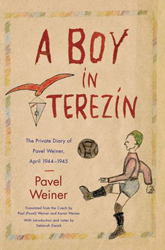In spring of 1945, as the Allies made progress on their liberation of Europe, Pavel’s mood lifted and he could again hope that freedom would come at last. Pavel wrote that freedom was such a beautiful concept for him and that he would be willing to risk his life for it. By late April, air raids occurred daily as the Allies approached the Czech border. The prisoners in Terezin were distraught by the arrival of emaciated survivors from Nazi death camps. In a deeply moving scene, Pavel took his bread ration and handed it to his mother, Valy, saying, “Give it to my father when he arrives.”
Pavel’s last entry was April 22, 1945 and in it he described a chaotic day in Terezin. Hundreds of people ran away with as many stolen goods as they could carry, a quarantine was placed on part of the camp and many inmates were fighting with each other. Then the good news arrived that the Red Cross was now taking care of them. Hope arose that freedom was drawing near. Soon after, Terezin was liberated and Pavel returned to Prague with his mother. They searched for Ludvik and Handa, and Pavel learned that his father and brother did not survive. We do not learn his thoughts from this time, as Pavel no longer kept a diary after he left Terezin.
In 1948, Pavel and his mother moved to Canada, and Pavel later moved to New York City, where he married and had a successful career as a chemical engineer. He had one child, a daughter named Karen. In 1979, Pavel discovered that his mother had kept his diary for all those years and he made the decision to edit the diary and translate it into English. It took Karen a long time before she could bring herself to read the diary, afraid of what she would find. After reading his diary and accompanying her father to Terezin, Karen believed that her father’s story should be shared. She began assisting her father with editing the translations. Sadly, Pavel did not live to see his diary published, but Karen persevered and the diary was published in 2012, ensuring that her father’s experiences would be shared with others.
Further Reading
A Boy in Terezin: The Private Diary of Pavel Weiner, April 1944-April 1945
By Pavel and Karen Weiner
